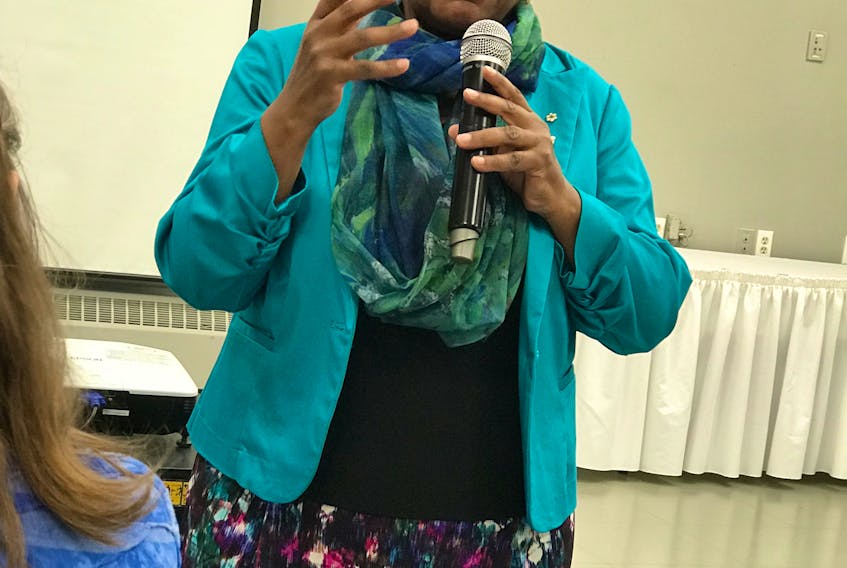If the federal government wants to improve the lives of Black Canadians, it can start by figuring out exactly where inequalities exist, a group of parliamentarians says.
Nova Scotia Senator Dr. Wanda Thomas Bernard is one of eight members of the Parliamentary Black Caucus who penned an open letter to the federal government this week calling for swift and concrete reforms in a number of areas.
The letter, which was also signed by a long list of allies — MPs from the Liberal, NDP and Green parties as well as senators — focuses on reforms to justice, economic development and supporting Black arts and culture.
One of its key recommendations focuses on the need to measure the pervasiveness of systemic discrimination through the collection of disaggregated race-based data via Statistics Canada and other federal bodies.
Call to dig for data

The letter calls on the federal government to immediately lead in the collection, stewardship and analysis of disaggregated data, including intersectional data, and to make that data publicly available for further analysis.
The statement notes that in 2018, the federal government began a more serious effort to do so, but there is a consensus that its efforts must move faster and go much further.
Though Bernard said the long-term collection of disaggregated data especially in areas like policing and health care is important, the government could take an immediate stand and enable the collection of disaggregated COVID-19-based data.
Statistics Canada has already begun collecting data on the effects of COVID-19 on Canada.
Bernard said the COVID-19 pandemic is making racial disparities in both health outcomes and economic outcomes much more visible, and the only way to quantify that, and to fix it, is to be aware of exactly where those disparities occur.
For example, Bernard said there is an over-representation of Black women and other racialized women who work as personal care workers in long-term care facilities, which have been severely hit by COVID-19 in many provinces.
“And you look at the numbers that are immigrants and low income, and the fact that they may be more likely to be living in multigenerational households that are not large enough for them to be able to properly self-isolate if they need to,” she said. “And they're essential workers, so they've had to work through COVID. When you look at all of those realities, you really see the disparities.”
That disparity is also being seen in the way Black-owned businesses are being disproportionately effected by the pandemic, she said.
“Many of them fall through the cracks and have not been able to benefit from any of the funding that's been allotted for business owners for various reasons,” Bernard said.
“One of the messages that we've heard from politicians and public health officials for months now is that we're in this together, but it sure doesn't feel like it when you see these disparities and you see people really struggling to hold onto businesses that they built.”
Justice reform
Bernard said another immediate area the government could focus on is justice reforms — specifically supporting efforts to eliminate mandatory minimum sentences.
Ontario Senator Kim Pate tabled a bill in February that, if passed, would allow judges to disregard minimum mandatory sentences, which have been proven to unfairly affect Black and Indigenous Canadians.
“The over-representation of Indigenous and Black Canadian men and women in prison is something that we need to address in this country. We need to look at that whole prison industrial complex and how that's benefiting some people and disadvantages others,” Bernard said.
Prime Minister Justin Trudeau was asked this week about plans to implement any of the calls to action, including ending mandatory minimum sentences.
“We’re going to continue to look at that and other measures that we can move forward to make sure that our justice system does not continue to be unfair towards racialized Canadians and Indigenous Canadians,” he told reporters.
“I’ve said many times we are committed to moving forward on a huge range of measures. We’re working with communities. We’re working with leaders like members of the Parliamentary Black Caucus to identify what exactly we need to move forward first in priority on. But I think it’s important that we all come forward and look at bold ideas that we can take on very soon to fix the systemic discrimination that continues to exist in our country.”
Echoes across the continent

Bernard said it’s clear the calls for change that have echoed across the U.S. and Canada in recent weeks have been the result of a tipping point — the COVID-19 pandemic has collided with the pandemic of racism, she said.
“What we're seeing with these global protests, we're seeing people around the world and across this nation really pushing for change, and I think for many people of all ages, of all races, it's become a bit of a wake-up call,” she said.
“We've been hearing from Black Canadians from coast to coast and people want action. They don't want further studies. They don't want platitudes. They really want action. They want action taken on issues that we've been talking about for generations.”
Her fear, however, is that once the dust settles, the momentum for change will die down.
“There's a part of me that says, OK, how many people are protesting because they really believe this and this, or how many people are just looking for something to do, because they're tired because of the lockdown. When they can get back to their regular lives, will this be forgotten? I can only hope that, for a majority, it's more than this moment in time,” she said.









